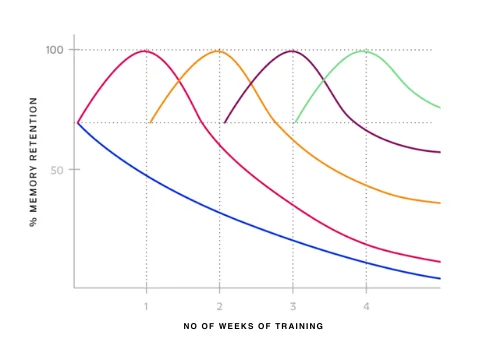Drive Long Term Knowledge with Spaced Repetition Training
Spaced repetition isn’t just a learning strategy; it’s a brain booster that locks down key concepts in memory by circling back at just the right moments. This clever approach not only increases knowledge retention but also turns your training dollars into performance power-ups.

Drive Long Term Knowledge with Spaced Repetition Training
Spaced repetition isn’t just a learning strategy; it’s a brain booster that locks down key concepts in memory by circling back at just the right moments. This clever approach not only increases knowledge retention but also turns your training dollars into performance power-ups.


Where Serious Science Meets Seriously Fun Training
Dive into the digital learning revolution with Wranx! Our cutting-edge platform is more than just an online classroom; it’s a brain-boosting powerhouse. Using spaced repetition, a nifty method proven to turbocharge retention, we make forgetting a thing of the past.
At the heart of Wranx’s snazzy setup is spaced repetition — not just any learning trick, but a scientifically-backed super strategy. It plays on the brain’s love for timely nudges right when it’s about to let facts slip away. By smartly tweaking when to pop quiz your employees, Wranx turns fleeting facts into lasting knowledge, ensuring your training is not just learned but remembered. Get ready to see your team transform with learning that sticks!
Where Serious Science Meets Seriously Fun Training
Dive into the digital learning revolution with Wranx! Our cutting-edge platform is more than just an online classroom; it’s a brain-boosting powerhouse. Using spaced repetition, a nifty method proven to turbocharge retention, we make forgetting a thing of the past.
At the heart of Wranx’s snazzy setup is spaced repetition — not just any learning trick, but a scientifically-backed super strategy. It plays on the brain’s love for timely nudges right when it’s about to let facts slip away. By smartly tweaking when to pop quiz your employees, Wranx turns fleeting facts into lasting knowledge, ensuring your training is not just learned but remembered. Get ready to see your team transform with learning that sticks!
BENEFITS
How spaced repetition will supercharge your team’s knowledge

long term knowledge retention
Reduces the amount of information yoru staff forget by repeating information at spaced intervals

reduces mental exhaustion
Information is delivered in short bursts which prevents fatigue and combats short attention spans

quick & engaging
Works on the concept that short and frequent training builds long term knowledge retention
“Wranx has given us increased flexibility to deliver training content and updates to our reps in a manner that is quick, engaging and fast, ensuring our reps retain new information as quickly as possible. It is an amazing partner in our education program and has proactively helped us to reach our goals.”
Catherine Osborne
Manager of Education and Knowledge, Vrbo
“Wranx has given us increased flexibility to deliver training content and updates to our reps in a manner that is quick, engaging and fast, ensuring our reps retain new information as quickly as possible. It is an amazing partner in our education program and has proactively helped us to reach our goals.”
Catherine Osborne
Manager of Education and Knowledge, Vrbo
The Curious Case of the Forgetting Curve
Meet the forgetting curve, our brain’s natural tendency to let unreviewed information slip away, first discovered by German psychologist Hermann Ebbinghaus in the late 19th century. This curve shows a sharp initial drop in memory retention, followed by a gradual fade.
Here’s where spaced repetition steps in like a memory superhero—perfectly timed reviews that transform learning from fleeting to sticky. It’s the secret sauce behind platforms like Wranx, turning forgetfulness into lasting knowledge and improved performance. Get ready to keep what you learn, one smart reminder at a time!
The Curious Case of the Forgetting Curve
Meet the forgetting curve, our brain’s natural tendency to let unreviewed information slip away, first discovered by German psychologist Hermann Ebbinghaus in the late 19th century. This curve shows a sharp initial drop in memory retention, followed by a gradual fade.
Here’s where spaced repetition steps in like a memory superhero—perfectly timed reviews that transform learning from fleeting to sticky. It’s the secret sauce behind platforms like Wranx, turning forgetfulness into lasting knowledge and improved performance. Get ready to keep what you learn, one smart reminder at a time!

See how you can supercharge your team's knowledge with Wranx. Book a demo today!
Book a meeting with our team to see how Wranx can make training quick, fun and impactful.
We'll discuss your challenges, goals, and how Wranx can help you reach them. After that, we can give you a full demo of our microlearning platform.